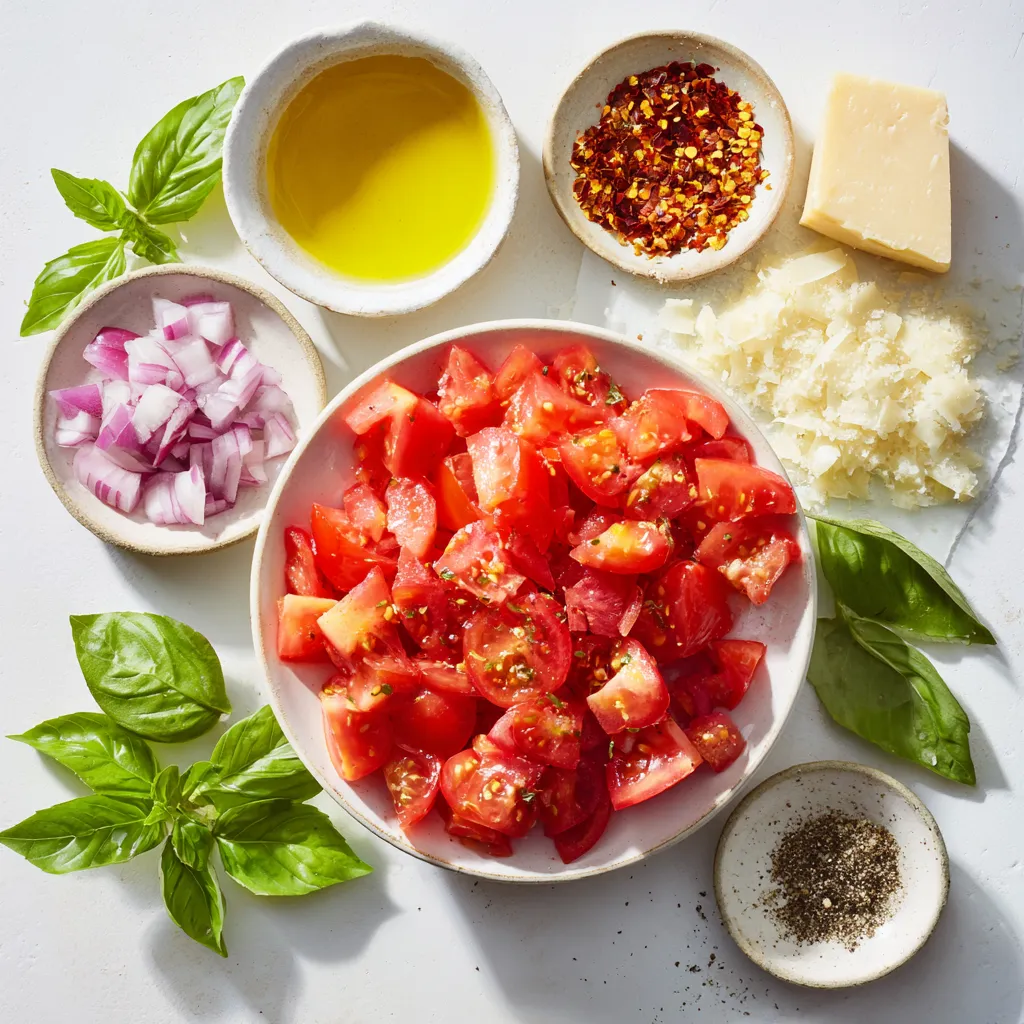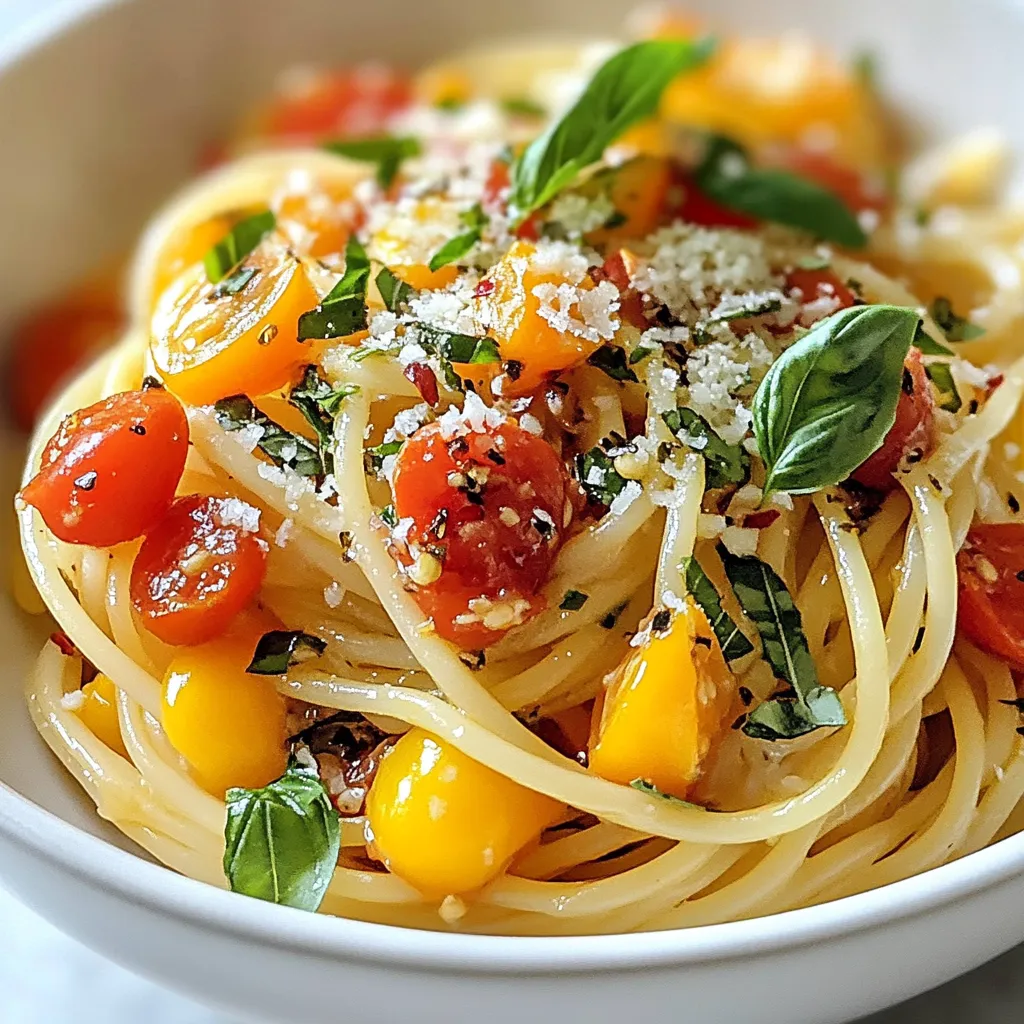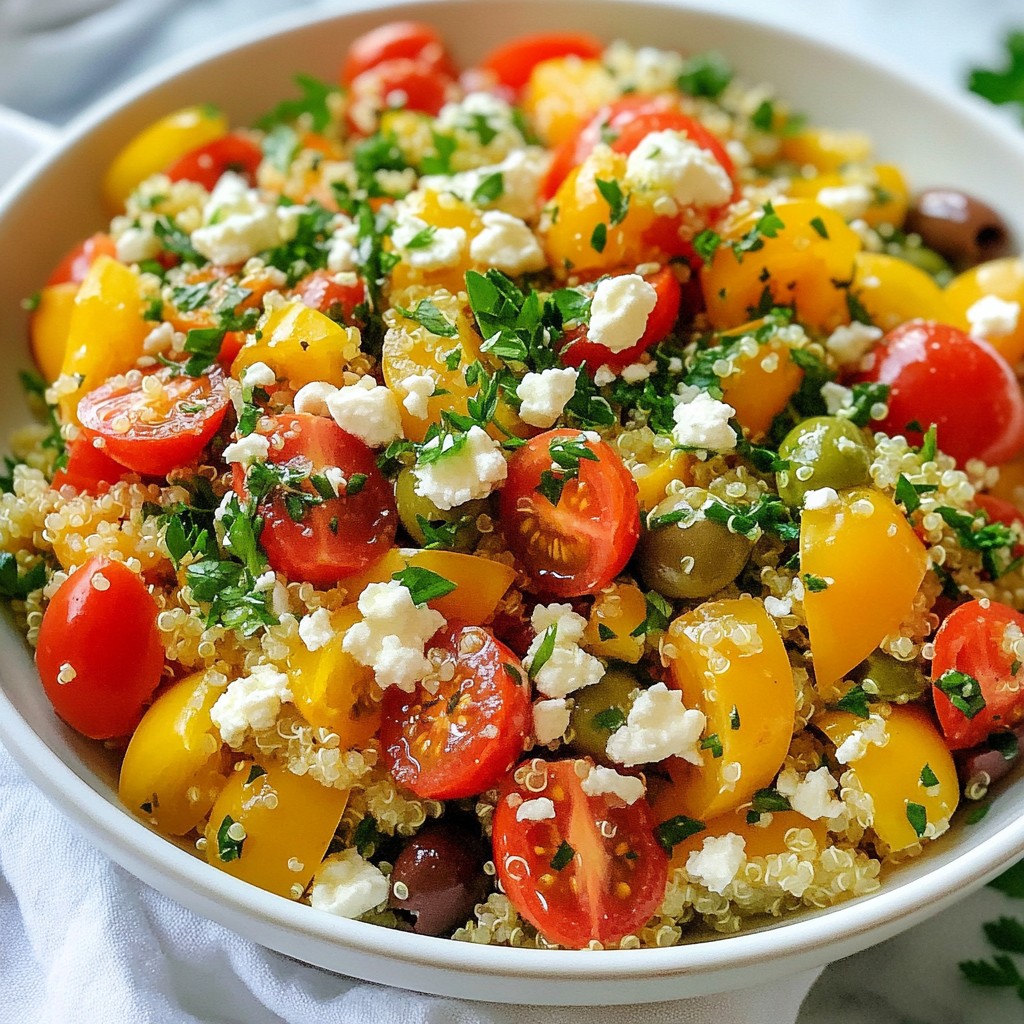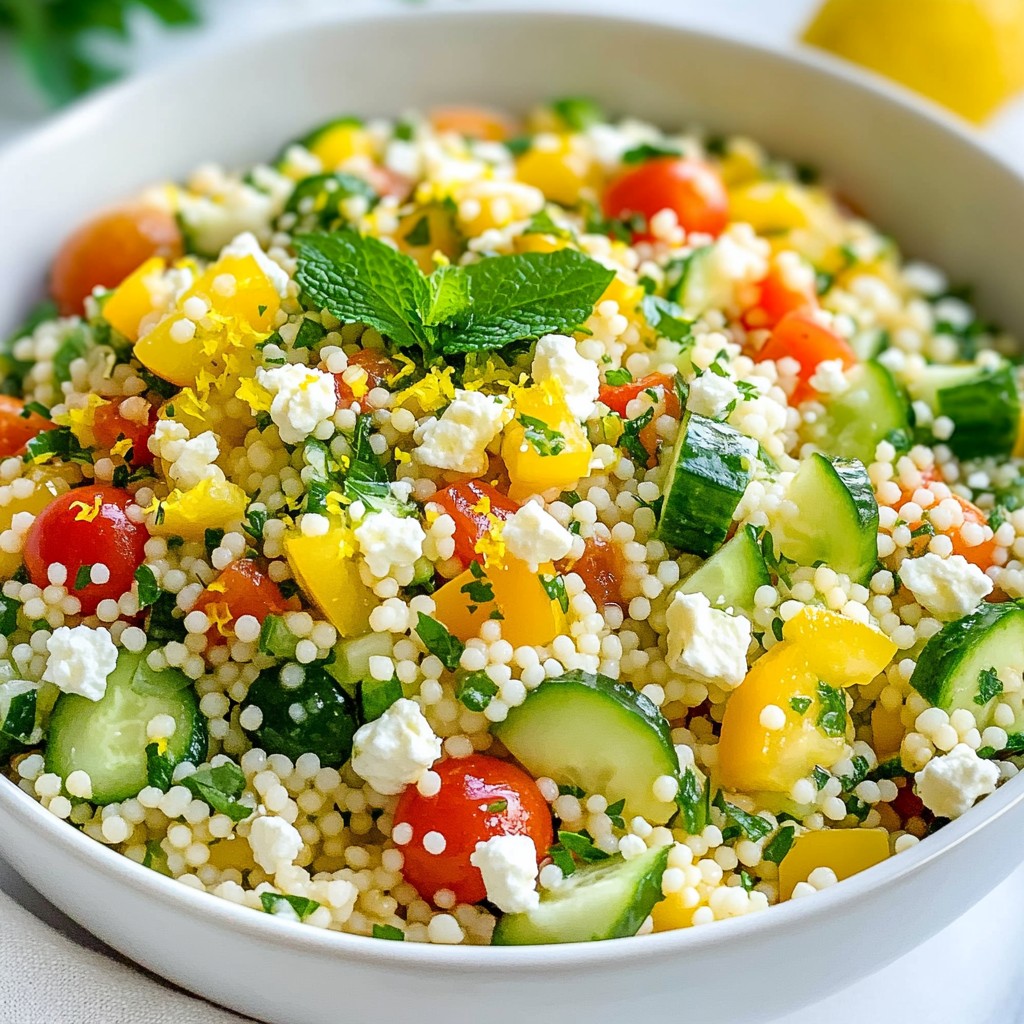Are you ready to enjoy a delicious and easy meal? This Fresh Tomato Pasta recipe brings together bright flavors and simple steps. With just a few key ingredients, you can make a dish that tastes like summer. I’ll guide you through choosing the best tomatoes, cooking the pasta perfectly, and adding tasty tweaks. Let’s dive into this flavor-packed world together! You’ll impress everyone at the dinner table.
Why I Love This Recipe
- Fresh Ingredients: This recipe highlights the vibrant flavors of garden-fresh tomatoes and aromatic basil, making each bite a taste of summer.
- Quick and Easy:
- Customizable: You can easily adjust the heat level by adding or omitting red pepper flakes and incorporate other vegetables as desired.
- Healthy and Light: This pasta dish is not only delicious but also light, making it a guilt-free option for pasta lovers.
Ingredients
Key Ingredients for Fresh Tomato Pasta
To make this fresh tomato pasta, gather these key ingredients:
– 400g spaghetti or your preferred pasta
– 6 ripe heirloom tomatoes, diced
– 3 tablespoons extra virgin olive oil
– 3 cloves garlic, minced
– 1 small red onion, finely chopped
– 1 teaspoon red pepper flakes (optional for heat)
– Salt and pepper to taste
– 1 cup fresh basil leaves, torn or chopped
– 50g parmesan cheese, grated (optional for garnishing)
Each ingredient plays a big part in making this dish tasty and fresh. The heirloom tomatoes bring a sweet flavor and juicy texture. The garlic and onion add depth, while the olive oil provides richness.
Best Types of Tomatoes to Use
When choosing tomatoes, I recommend using heirloom varieties. Heirloom tomatoes are sweet and have a lovely texture. You can also use Roma tomatoes for a more classic taste. They hold up well in sauces and have fewer seeds. If you want a bold flavor, try using cherry tomatoes. Their sweetness can brighten the dish.
Optional Additions for Flavor Enhancements
To make this pasta even better, consider adding these options:
– Fresh herbs like parsley or oregano for extra flavor
– A splash of balsamic vinegar for tanginess
– Crushed nuts like pine nuts for texture
– A sprinkle of lemon zest for brightness
These additions can change the dish’s flavor profile. Feel free to mix and match based on your taste. Each option can make your meal unique and delicious!

Step-by-Step Instructions
Cooking the Pasta Perfectly
Start by boiling a large pot of salted water. Add your spaghetti and cook it until al dente. This usually takes about 8 to 10 minutes, but check the package for exact times. Once done, reserve 1 cup of the pasta water. This water has starch, which helps the sauce stick. Drain the pasta and set it aside.
Sautéing Aromatics for Maximum Flavor
In a large skillet, heat 3 tablespoons of extra virgin olive oil over medium heat. Add the finely chopped red onion. Sauté it for about 3 to 4 minutes until it softens. Next, add 3 cloves of minced garlic and 1 teaspoon of red pepper flakes if you like heat. Cook this mix for 1 to 2 minutes, but don’t let the garlic burn. The smell will be amazing!
Creating the Tomato Sauce
Now, it’s time for the star of the dish. Add 6 diced heirloom tomatoes to the skillet. Season the mix with salt and pepper. Cook this for about 5 to 7 minutes. Stir often as the tomatoes soften and create a light sauce. The juices will blend beautifully with the onions and garlic. Once it’s ready, toss the cooked spaghetti into the skillet. If it feels dry, add some reserved pasta water. Finally, fold in 1 cup of fresh basil leaves. Taste and adjust seasoning if needed. Enjoy your vibrant, fresh tomato pasta!
Tips & Tricks
How to Achieve Perfect Al Dente Pasta
To cook perfect pasta, start with a large pot of salted water. Use about one tablespoon of salt for every four quarts of water. Bring the water to a rolling boil. Add your spaghetti and stir it gently. Follow the package directions for cooking time. Test the pasta a minute early. It should be firm yet tender. This is the al dente stage. After cooking, save one cup of pasta water. This water helps bind your sauce.
Enhancing Flavor with Seasonings
Seasoning is key to a tasty dish. Use fresh herbs like basil to lift the flavor. Add salt and pepper to taste while cooking. If you like heat, include red pepper flakes. Sauté your garlic and onion until soft. This step makes the dish aromatic. Adding the diced heirloom tomatoes boosts flavor too. Let them cook down to create a light sauce. Adjust the seasoning as needed, tasting along the way.
Presentation Tips for Serving
A beautiful dish is always more inviting. Start by plating the pasta in deep bowls. Twirl the spaghetti for a nice shape. Top with fresh basil leaves for color. Sprinkle grated parmesan cheese if you like. Add extra red pepper flakes for a pop. You can also serve with crusty bread on the side. This adds a nice touch to the meal. Enjoy your dish with friends or family for a delightful experience!
Pro Tips
- Use Fresh Ingredients: The flavor of this dish relies heavily on the quality of the tomatoes and basil. Use the ripest, freshest produce you can find for the best results.
- Customize the Heat: Adjust the amount of red pepper flakes based on your heat preference. For a milder dish, use less or omit entirely, and for more heat, add a pinch more.
- Save the Pasta Water: The starchy pasta water helps to bind the sauce and pasta together. Always reserve some before draining the pasta to achieve the perfect consistency.
- Experiment with Cheese: While parmesan is a classic choice, try other cheeses like pecorino or a sprinkle of feta for a unique twist on flavor.
Variations
Vegetarian Variants
You can easily make this dish vegetarian. Simply skip the meat and focus on the fresh flavors. For a protein boost, add chickpeas or lentils. They add texture and keep it filling. You can also mix in seasonal veggies like zucchini or bell peppers. Their colors and crunch create a vibrant dish. Top it with extra basil for freshness.
Vegan Options
To make this pasta vegan, remove the parmesan cheese. You can substitute it with a mix of nutritional yeast and garlic powder for a cheesy flavor. This twist keeps the dish rich without dairy. Consider adding toasted nuts for crunch. Pine nuts or walnuts work well. They add good fats and protein. Don’t forget to use a vegan-friendly pasta.
Meat Additions: Chicken or Shrimp
For meat lovers, chicken or shrimp are great choices. If you choose chicken, cook it in the skillet first. Season it well and remove it before adding the onions. After cooking the sauce, mix the chicken back in. For shrimp, add them to the sauce last. Cook until they turn pink, about 3-4 minutes. Both options enhance the dish with savory depth. Enjoy your pasta with whatever variation you choose!
Storage Info
How to Store Leftover Fresh Tomato Pasta
To store leftover fresh tomato pasta, let it cool first. Place it in an airtight container. You can keep it in the fridge for up to three days. If you want to keep it longer, freezing is a great option.
Reheating Tips to Maintain Quality
When reheating, use a skillet for the best results. Add a splash of water or olive oil to keep it moist. Heat it over low to medium heat. Stir often until it’s warm. Avoid using high heat; it can dry out the pasta.
Freezing Fresh Tomato Pasta
To freeze your fresh tomato pasta, portion it into freezer-safe bags. Remove as much air as possible before sealing. Label the bags with the date. It can last up to three months in the freezer. When ready to eat, thaw it in the fridge overnight before reheating. Enjoy your pasta anytime!
FAQs
Can I use canned tomatoes instead of fresh?
Yes, you can use canned tomatoes. They work well in a pinch. Use whole or diced tomatoes. Choose good quality brands for the best taste. Keep in mind, fresh tomatoes add brightness. They give a unique flavor and texture. If you use canned, drain excess liquid. This helps keep your sauce from becoming watery.
What can I substitute for parmesan cheese?
If you need a substitute for parmesan cheese, try nutritional yeast. It gives a cheesy flavor without dairy. You can also use pecorino cheese. It has a sharper taste but works well. For a dairy-free option, try a cashew cheese blend. Blend soaked cashews with garlic and lemon juice. It creates a creamy, tasty topping.
Is this recipe gluten-free?
This recipe is not gluten-free as written. The spaghetti contains gluten. However, you can easily make it gluten-free. Choose gluten-free pasta made from rice or quinoa. Cook it just like regular pasta. Follow the same steps in the recipe. The flavor will still be delicious and satisfying.
In this post, we explored how to make fresh tomato pasta. We discussed key ingredients and the best tomato types. I shared step-by-step instructions, tips for perfect pasta, and serving ideas. We also looked at tasty variations, storage tips, and answered common questions.
Fresh tomato pasta is flexible and easy to make. With the right ingredients and techniques, you can enjoy a delicious meal. Experiment with flavors and have fun in the kitche




